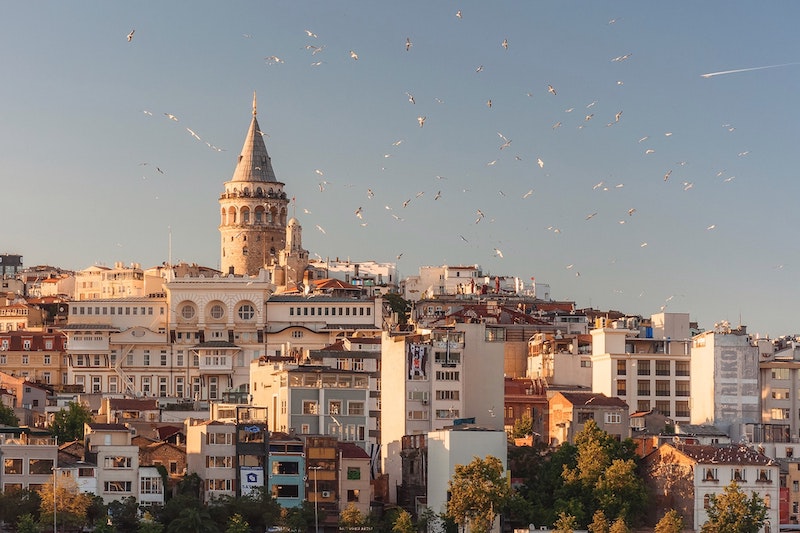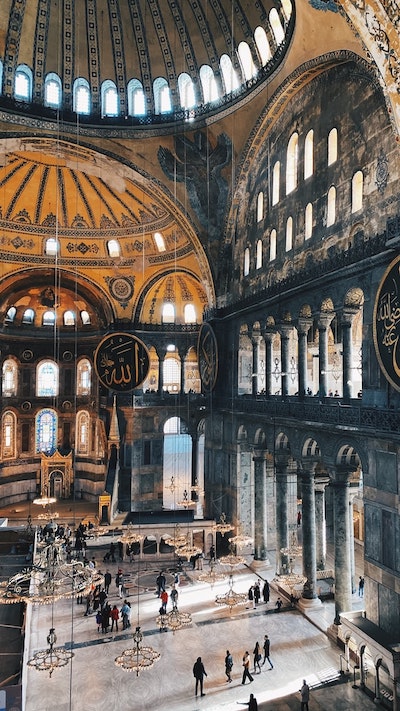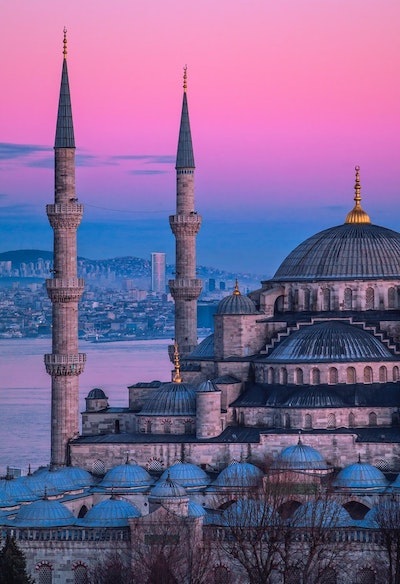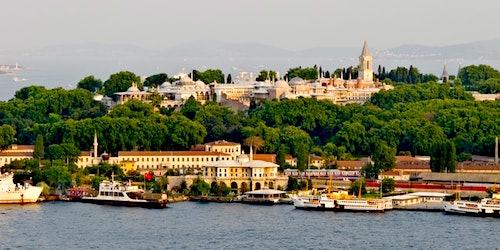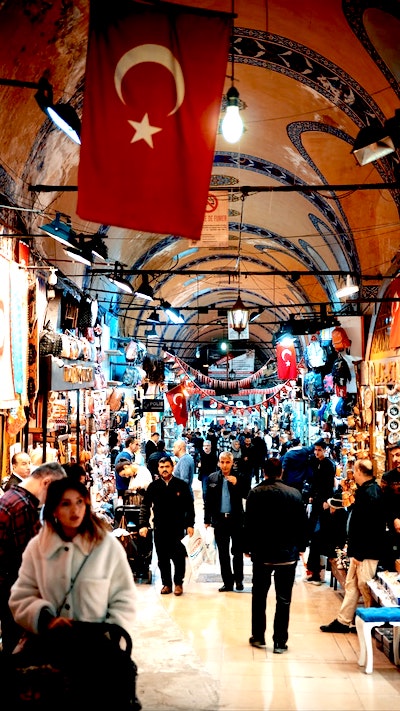An introduction to Istanbul, Turkey, a cultural stepping stone between Europe and Asia
Istanbul is a fascinating city, rich in culture and steeped in the kind of history that could have come straight out of a historical novel. One of the many things that makes Istanbul special is the fact that it’s a transcontinental city split across two continents, Europe and Asia.
Istanbul highlights for digital nomads
- A highlight for digital nomads wanting to experience a rich and authentic culture
- Accommodation is affordable for a large city
- Turkey has an amazing food culture
- Rich in history
- Plenty to see and do in and around Istanbul
- Opportunity to cross easily between Europe and Asia
- Istanbul is a great jumping-off point for further travels into Eastern Europe, Asia, the Middle East and Africa
Istanbul is a megacity with over 15 million inhabitants
Istanbul is one of the most populous cities in the world with over 15.64 million inhabitants making it a megacity. To put that into perspective, the population of Istanbul city is one and a half times the entire population of Portugal or nearly double the population of Austria! Istanbul has become increasingly popular with digital nomads due to a relatively low cost of living, temperate weather, amazing food scene and rich cultural heritage. Read on to discover what makes Istanbul a hot spot for digital nomads and one of the destinations that should be on your digital nomad destination list.
The rich history of Istanbul, Turkey
The city we now know as Istanbul was founded in the 7th century BC as Byzantium by Greek settlers from Megara. In the year 330 AD the Roman emperor Constantine the Great declared it his imperial capital and renamed the city, Nova Roma (New Rome). Eventually he renamed the city Constantinople, after himself in true Roman form! Constantinople served as an imperial capital for nearly 1600 years.
On 19th May 1453, Constantinople fell to the Ottomans after a bloody siege that lasted 55 days under command from Sultan Mehmed II. Sultan Mehmed II modelled himself on Alexander the Great and was determined to capture Constantinople whatever the cost. Many had failed to breach the city walls including his father before him. Undeterred he continued on and eventually breached the walls. One of the reasons his campaign succeeded was his use of massive cannons, a breakthrough military technology at the time; these cannons bombarded the walls day and night and played a large part in the eventual success of the campaign.
In 1923 following the Turkish war of independence the city of Ankara replaced Constantinople as the capital of the newly formed Republic of Turkey. In 1930, the city was renamed once again, this time to Istanbul.
Modern day Istanbul, a vibrant, multicultural metropolis
Istanbul is the historical, financial, business and cultural hub of modern Turkey, much like New York City in the United States. While Ankara may be the capital of Turkey, Istanbul is the largest city and where most of the action is. The most widely spoken language in Istanbul is Turkish. English is spoken but not as widely when compared to other digital nomad hubs such as Lisbon. Other languages spoken include, Kurdish, Arabic, German, French, Spanish, Italian, Russian and Azerbaijani. If you are in mainstream areas you should get by fine with English. The people are friendly and other digital nomads who have stayed in Istanbul have recounted that the locals on the whole are very welcoming and will try to make an effort if there’s a language issue or find someone who will step in to help.
Is Istanbul strictly religious?
The population of Turkey is 99% Muslim, mainly Sunni, Turkey is a Secular state, meaning that all citizens are treated equally irrespective of what religion they choose to follow. As with virtually all Islamic countries and Asian countries too, there is a certain level of modesty when it comes to dress and showing physical affection publicly, however Istanbul is on the whole a very modern and tolerant city and religion shouldn’t be a reason not to make Istanbul your next remote work location but rather one of the reasons to go and experience the rich culture on offer.
If you are respectful of the local culture and norms you should have no problems. Alcohol is available and there is no problem if you want to enjoy a glass of wine, beer or cocktail after a hard day’s work. If you are not a devout Muslim, one thing to keep in mind is the calls to prayer that happen 5 times a day starting very early in the morning. These are broadcast on speakers at mosques around the city so you might want to keep this in mind when deciding where you will be staying, especially if you are a light sleeper. Visits to mosques by foreigners are completely welcome but you should take care to dress appropriately, ideally a headscarf for women, legs covered and shoes off for men and women.
The cost of accommodation for digital nomads in Istanbul
Istanbul is very affordable as a city, especially if you earn your money in British pounds, Euros or US Dollars. In general the Asian side of Istanbul on the other side of the Bosphorus river tends to be more affordable when compared to the European side.
An apartment can cost on average €500 – €1500 on airbnb depending on location and how nice it is. If you are the type that prefers the comforts of a hotel, a 30 night stay at a hotel in Istanbul could set you back €1000 and upwards which is not too bad at all. A hotel can be a great option if you are looking to stay for a shorter period and would like amenities like daily breakfast, daily housekeeping, room service, a pool, spa or gym and a central location.
You can expect a very reasonable cost of living in Istanbul
Istanbul is a very affordable city where you can enjoy a pretty good quality of life at a relatively modest cost. As with all major cities, there are plenty of ways to spend your money if you are flush. The sweet spot is probably somewhere in the middle. You can enjoy delicious Turkish street food at very affordable prices and for those special occasions go to a fancy restaurant. Groceries are also very affordable and we would recommend visiting local fruit and veg markets for the freshest produce whilst soaking up a little of the local culture that you will be sure to find in the markets.
Recommended areas to stay in Istanbul as a digital nomad and also for visits as a tourist
Besiktas
Besiktas is a more upscale district on the European side of the Bosphorus and includes neighbourhoods such as Etiler, Bebek, Levent and Ortakoy. Besiktas is also home to one of the top soccer teams in Turkey, Besiktas J.K.
Kadikoy
On the Asian side of the Bosphorus you can find Kadikoy. It is becoming pretty hip in recent years but still retains a residential vibe. Despite this, you’ll find plenty of cafes, restaurants and nightlife options to keep you occupied.
Atesehir
Another neighbourhood on the Asian side is Atasehir. Atesehir is a new area when compared to historic Istanbul and investment in local infrastructure has made it a popular place to live for locals and expats alike.
Beyoglu
Beyoglu is another of the more upmarket areas on the European side. You can expect to pay more for your accommodation in this fashionable neighbourhood. It is a convenient area to stay when it comes to visiting popular sightseeing destinations such as Taksim Square, Galata Tower and 1.4km long Istiklal Street which is one of the most elegant avenues of Istanbul on which to go for a stroll, partake in some shopping, enjoy a meal or a coffee and enjoy beautiful architecture from the mainly Ottoman-era
Uskudar
One of the oldest districts of Istanbul found on the Asian side is Uskudar. In Uskudar you can enjoy magnificent views over Istanbul and easily visit important sights such as the Maiden’s Tower, Fethi, Pasha Grove and Camlica Hill. Uskudar is considered a more tranquil area with more of a village vibe and not the place to find a vibrant nightlife. Uskudar is Ideal for those looking for a quiet, residential vibe yet being just a stone’s throw away from some of the important sights of Istanbul on the Asian side of the Bosphorus.
Nisantasi
Nisantasi is one of the most upscale and elegant neighbourhoods of Istanbul. This is an area to consider if you don’t mind spending more on your accommodation and are attracted by designer boutiques, Art Nouveau buildings, trendy restaurants, bars and galleries. It’s where the Turkish jet-set can be found.
The local Turkish food is simply to die for in Istanbul!

If you are a foodie with a weakness for middle eastern style cuisine then you will not be disappointed. While meat and fish (excluding pork) are quite prevalent you will also not be disappointed if you are vegan or vegetarian. One of the delights is the mezze, think of it as the Turkish equivalent of Spanish tapas, a selection of warm and cold dishes served in small portions. Usually, the mezze will be accompanied by some form of pitta bread. As food is probably one of the major highlights of any visit to Istanbul we have provided a little overview of some of the delicious dishes to look out for when trying a mezze.
Fava – Fava is a hummus style dish made from fava beans, rich in proteins and nutrients and prepared with olive oil and onion and is vegan friendly.
Mercimek köftesi – Mercimek köftesi are red lentil patties and completely vegan friendly. They are made from protein rich lentils and bulgur and the dish is served cold
Muhammara – Muhammara is a delicious dip made from roasted red peppers and walnuts, another one perfect for vegans and vegetarians
Babagannuş – Babagannuş is one of the most popular Turkish mezze dips made by baking an aubergine, pureeing it and mixing with tahini and again vegan and vegetarian friendly.
Haydari – Haydari is a Garlic yogurt dip and is usually accompanied by pitta bread. Haydari is really delicious and certainly a bit healthier than mayo.
Havuç Tarator – Havuç Tarator is a carrot yogurt dip a bit like a Tzatziki but made with grated carrot instead of cucumber.
Humus – Humus is a deliciously creamy chickpea and tahini dip that no mezze selection would be complete without. Made with smashed chickpeas, tahini, lemon juice and garlic and usually drizzled with olive oil and served with pitta bread. Hummus is another veggie favourite.
Kısır – Kisir is a bulgur based salad that is high in fibre and tasty too. Kisir originating from the North East favours lemon juice while the version from the South West favours tart pomegranate juice.
Istanbul has a great public transport system offering an easy and affordable way to move around the crowded city
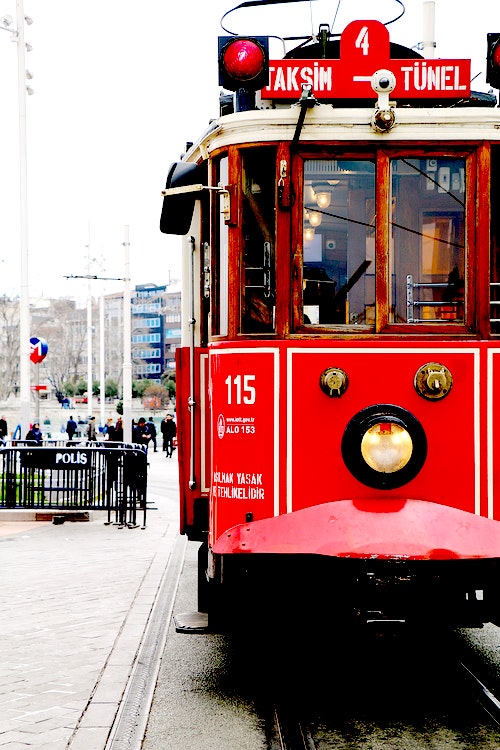
As with all major megacities, transportation can be a headache and Istanbul is no exception. With nearly 16 million inhabitants and millions of additional visitors in the form of tourists, digital nomads and business people it’s essential that people can get around easily and affordably. Fortunately, Istanbul has a very good public transport system consisting of buses, trams, a metro system and ferries. All of these services can be accessed with the use of a single card, the Istanbulkart (Istanbul Card), you simply add cash to your card and then can use all public transport without needing cash. For more information about the Istanbulkart, where to get it and how to use it you can visit https://visit.istanbul/en/istanbul-kart/
Airports and getting into the centre of Istanbul
Istanbul offers two airports, the bigger airport is Istanbul Airport (IST) which can be found on the European side and is closer to the main attractions. There is also a smaller airport on the Asian side called Sabiha Gokcen Airport (SAW). If you are going to be staying on the European side it would be easier to fly in and out of IST. The easiest way of getting from Istanbul airport (IST) to the city centre would be by taxi which could cost somewhere €32 and takes around 50 mins. From Istanbul SAW airport a taxi could cost in the region of €24 and take around one hour into the city centre.
Things to see and do in Istanbul
When you are ready to pack away your laptop, get out and explore Istanbul there are plenty of choices to keep you occupied. Below are a few of the attractions that should be high on your list of places to visit in Istanbul
Go watch Istanbul soccer team Besiktas play a home game at Vodafone Park Stadium
If you are a soccer fan then a trip to go see Besiktas play should be high on your list. Besiktas is one of the top three Turkish football teams and has never been relegated in its history going back to 1903. Besiktas is one of the most successful football teams in Turkey and a team from Istanbul, so any trip to Istanbul should include a home game to soak up some of the atmosphere. Since 2016 Besiktas play their home games at Vodafone Park.
Visas and entry requirements for visitors to Istanbul
Turkey has agreements with many countries meaning that they can travel visa free for up to 90 days in a 180 day period without requiring a visa. Other countries require an e-visa however it’s not expensive and easy to get online. More info on the Turkey e-visa can be found here > https://www.evisa.gov.tr/en/
Countries that are exempt from a Turkish Visa
The nationals of 78 countries and territories don’t require a visa before travelling to Turkey for tourism or business reasons and can stay for up to 90 days in any 180 day period, interrupted or uninterrupted.
| Albania | Andorra | Argentina |
| Belize | Bolivia | Bosnia and Herzegovina |
| Brazil | Bulgaria | Chile |
| Colombia | Czech Republic | Denmark |
| Ecuador | El Salvador | Estonia |
| Finland | France | Georgia |
| Germany | Greece | Guatemala |
| Honduras | Hong Kong | Hungary |
| Iceland | Iran | Israel |
| Italy | Japan | Jordan |
| Kazakhstan | Kosovo | Kuwait |
| Kyrgyzstan | Lebanon | Liechtenstein |
| Lithuania | Luxembourg | Malaysia |
| Moldova | Monaco | Montenegro |
| Morocco | New Zealand | Nicaragua |
| North Macedonia | Panama | Paraguay |
| Peru | Qatar | Romania |
| Saint Kitts and Nevis | San Marino | Serbia |
| Seychelles | Singapore | Slovakia |
| Slovenia | South Korea | Sweden |
| Switzerland | Tajikistan | Trinidad and Tobago |
| Tunisia | Ukraine | Uruguay |
| Uzbekistan | Vatican City | Venezuela |
| United Kingdom |
Citizens of countries that require a Turkish e-visa
Passport holders of the following 40 countries and territories can obtain e-Visas online for a small fee prior to arrival. The duration of stay for most of these countries is 90 days within 180 days however in some cases it’s only 30 so it’s best to check for sure before you travel to Istanbul.
| Antigua and Barbuda | Armenia | Australia |
| Austria | Bahamas | Bahrain |
| Barbados | Belgium | Canada |
| China | Croatia | Cyprus |
| Dominica | Dominican Republic | East Timor |
| Fiji | Grenada | Haiti |
| Indonesia | Ireland | Jamaica |
| Maldives | Malta | Mauritius |
| Mexico | Netherlands | Norway |
| Oman | Poland | Portugal |
| Saint Lucia | Saint Vincent and the Grenadines | Saudi Arabia |
| South Africa | Spain | Suriname |
| Taiwan | United States |
Electrical power and internet access for those all important gadgets that every digital nomad needs to survive!
In Turkey, the electrical voltage is 230v with a frequency of 50 Hz and the power outlets are the standard type found in most European countries, namely round plugs with two round prongs.
Compared to other parts of Turkey Istanbul can offer wifi speeds up to 32 mbps but speeds can vary from place to place. Free wifi is included by most accommodation providers but it would be a good idea to confirm how good the internet is if high speed internet is crucial to your daily work.
There are dedicated co-working spaces dotted around Istanbul where you can get stable fast internet along with nice working facilities, otherwise cafes offering free wifi are worth a try.
The internet quality in general compared to some other digital nomad destinations may not be as good but you’ll always find places that are fast and stable enough to get your work done.
Istanbul wrap up
There are so many reasons for Istanbul making the list for digital nomads in the search for culture and adventure. As a fantastic jumping-off point for further nomad travels, finger-licking food, plenty of activities to engage in and a relatively low monthly cost of living, Istanbul is one we highly recommend.

